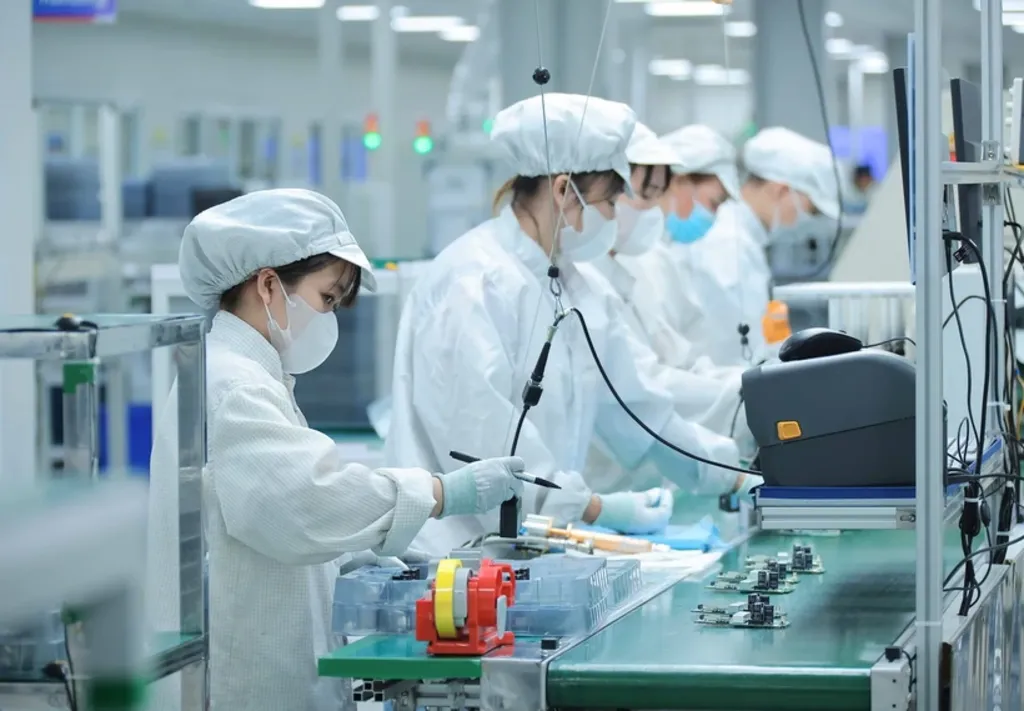 |
| Inside an electronics factory in Ha Nam Hi-Tech Park__Photo: VNA |
The National Assembly has recently adopted the revised Law on Corporate Income Tax, which aims to create a clearer and more transparent legal framework, thereby improving the investment and business environment and encouraging the development of enterprises.
Expanded tax incentives for key sectors
A top concern among enterprises regarding the amended law is the preferential corporate income tax rates, which are set at 10 percent, 15 percent, and 17 percent.
Notably, the 10-percent tax rate will apply to new investment projects in specific sectors such as hi-tech application, venture investment, software production, cybersecurity, supporting industries, renewable and clean energy, environmental protection, and infrastructure for water and electricity supply. It will also apply to new projects located in hi-tech parks, hi-tech agricultural zones, concentrated digital technology zones, and economic zones situated in areas eligible for tax incentives. These projects will enjoy the 10-percent rate for 15 years.
The 15-percent tax rate will apply to enterprises involved in the cultivation of forest products; crop production; production of products from planted forests; livestock farming; aquaculture; and processing of agricultural and aquatic products. It also applies to income from the processing of agricultural and aquatic products; socialization in education and training, vocational training, healthcare, culture, sports, and the environment; investment in and operation of social housing; publishing; and journalism.
Meanwhile, the 17-percent tax rate will apply for a period of 10 years to new investment projects in prioritized industries, including the production of high-grade steel; energy-efficient products; machinery and equipment for agriculture, forestry, fishery, and salt production; irrigation equipment; animal and aquaculture feed; automobile manufacturing and assembly; production of digital technology products; and the development and operation of technical infrastructure facilities supporting small- and medium-sized enterprises and business incubators.
Importantly, these incentives will apply only to specific projects or incomes that meet defined criteria, not to the entirety of a business’s activities. The law also excludes subsidiaries or affiliated companies, thus preventing manipulation through artificial restructuring to gain tax benefits.
Sharing with Tuoi Tre Online, Mai Huy Tuan, CEO of SSI Digital, expressed optimism over the amended law’s inclusion of tax incentives for venture capital funds and hi-tech projects. “Given the high upfront costs and long, uncertain payback periods in this sector, tax policy, while not eliminating risk, can provide crucial financial support to tech enterprises,” he said.
Nguyen Anh Khoa, Director of the Analysis and Research Division at Agribank Securities, stated that the amendments, particularly the expansion of eligible beneficiaries and the extension of tax exemption and reduction periods for key sectors such as high technology, innovation, and green transition, will help reduce operating costs for businesses and attract more investment inflows, especially high-quality foreign direct investment.
Concerns over law enforcement
Despite high expectations, many experts remain concerned about the implementation of the new law. Without a transparent, well-defined process for determining eligibility, the law risks becoming more of a barrier than a facilitator.
Nguyen Ngoc Tu, former official of the General Department of Taxation and currently a lecturer at the Hanoi University of Business and Technology, explained that while companies specializing in chip or software production can easily prove their eligibility, multi-sector enterprises or those applying high technology in only part of their operations may face significant difficulties in doing so. He also expressed concern that businesses may be forced to “request” official confirmation, leading to administrative burdens and informal costs. “Without fundamental reform, efforts to promote innovation will remain mere rhetoric,” Tu emphasized. As a solution, he proposed shifting focus to post-audit mechanisms rather than imposing numerous complex conditions upfront.
Echoing this concern, Tuan suggested that detailed guidance should be issued before the law takes effect this October. “Many startup founders and tech entrepreneurs are still very young, some just in their early twenties, and need support in accessing information and receiving clear implementation instructions,” he said.
Drawing on his experience with the Law on Supporting Small- and Medium-sized Enterprises, Khoa warned that even well-designed policies can fail without detailed guidance and effective coordination among ministries, sectors, and local authorities.
To ensure the law will bring about real positive impacts, he proposed several key measures, including promptly issuing clear and detailed implementing regulations with specific criteria for eligible sectors and regions; enhancing the role of business associations in monitoring and providing feedback on implementation; and establishing regular mechanisms for evaluating policy effectiveness to ensure that tax incentives do not remain only on paper.- (VLLF)









